News
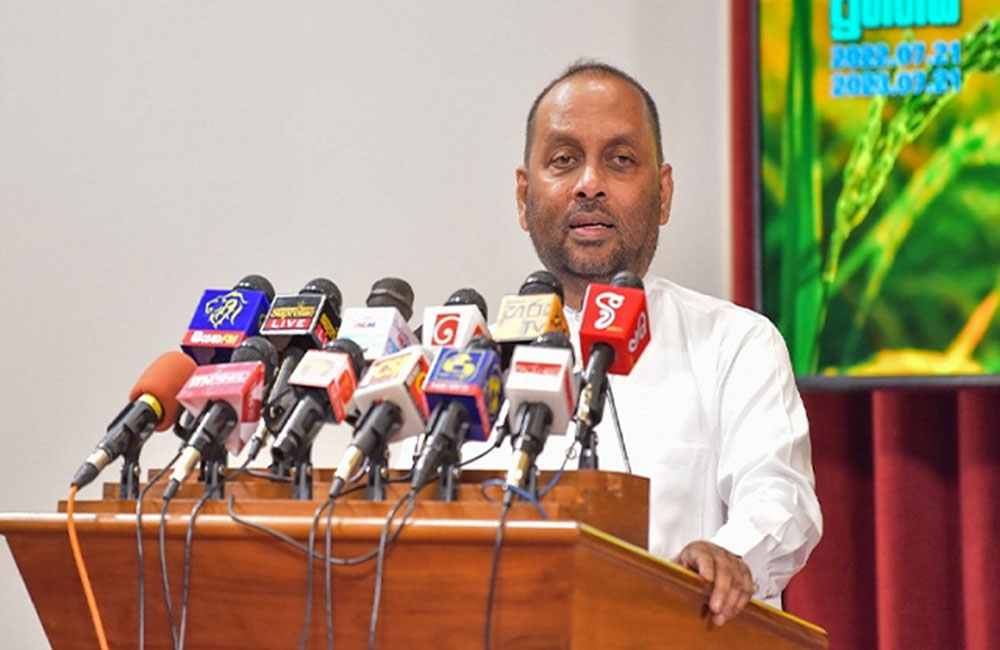
512,000 hectares of paddy fields cultivated in Yala season after 10 years - Minister
As a result of the new fertilizer policy of President Ranil Wickremesinghe, 512,000 hectares of paddy fields were cultivated in the Yala season after 10 years, Minister of Agriculture Mahinda Amaraweera said.
The minister added that 80% of the nation’s agricultural production is expected to be produced by 2025 as part of President Ranil Wickremesinghe’s strategy to modernize the agricultural industry, the President’s Media Division (PMD) said.
The use of contemporary technologies in agriculture can improve production of fruits and vegetables intended for export and reduce the amount of agricultural crops that are imported, Minister Amaraweera added.
He expressed these views today (17) during a press conference themed ‘One Year of Progress’ held at the Presidential Media Centre (PMC), it added.
Minister Mahinda Amaraweera further commented;
Within a year of taking office, President Ranil Wickremesinghe promptly fixed the farmers’ issues and tried to get them back to farming.
Without a doubt, the country’s circumstances were dire when President Ranil Wickremesinghe assumed office and I took over the Ministry of Agriculture. Farmers protested on the roads demanding fertilizer. The youths of the farming families left the farms and moved to other areas.
Some young people even left the country. The biggest issue in this case was guiding them back to the farmland. The public had no confidence in the Ministers. Even at the meetings on this problem, the farmers stayed away.
If they wish to return to the fields, they demand to be provided fertilizer. Although 275 000 hectares were supposed to be cultivated in that Yala season only 212, 000 hectares were cultivated. At that time, President Ranil Wickremesinghe negotiated with the Indian Government and arranged to provide 6,500 metric tons of fertilizer under the Indian loan scheme. However, the Indian loan arrangement does not allow for the provision of fertilizers. The fertilizer was imported from Oman. Only after learning that a ship carrying fertilizer was approaching the Port did the farmers venture back to their fields. This allowed for the cultivation of 512 000 hectares. It is now the most cultivated hectares in the Yala season after ten years.
The farmers arrived back at the farmland in this manner. A global food crisis was anticipated at the time, according to the warnings. Despite considerable success during the Yala season, 800,000 metric tons of rice had to be imported due to the fertilizer issue. The amount of rice that the government had to import was 300 million USD. For animal feed, another 100 million USD was invested. The farmers received fuel and financial aid to carry out the required farming tasks. Additionally, steps were taken to give small-scale farmers a supplementary urea fertilizer subsidy. Money was deposited to farmers’ accounts so they could also purchase organic fertilizers.
The Yala season has now begun. After three seasons, measures were taken to make mud fertilizer available without charge. The newly imported urea fertilizer is offered for Rs. 9000. A voucher of Rs.2000 is issued per one hectare to purchase Bundi fertilizer. The farmers have now received an unexpected subsidy. They did not request for free fertilizer. However, President Ranil Wickremesinghe is of the opinion that more help should be given to improve the status quo.
There is a chance to advance the level of our nation’s agriculture on a global scale. Modern technology is being introduced to agriculture through many means. There may be several difficulties here. However, every effort is made to develop agriculture using contemporary technologies. Numerous individuals, both inside and outside of the political sphere, have criticized these actions. They have alleged that imported fertilizers to be substandard and the harvest to be poor.
There are still plenty of initiatives to dissuade farmers. Despite what they claim, the farmers have returned to their farms. The Agricultural Services Act is currently being amended. In addition to the current subsidies, steps are being taken to provide subsidies in the cultivation of other crops. There are several areas where paddy agriculture is not profitable. The government is ready to help them grow other crops. They have the potential to earn more income by switching to other crops.
The farmers in this country would not only have abandoned their fields if the President had not come into power, but many of them might have also taken their own lives. And we could have become a weak nation due to scarcity of food.
When the President assumed office a year ago, food inflation was nearly 90%. So far, food inflation has decreased to 4.1%. All the farmers of this country deserve the respect and praise of the citizens for being committed to create a renaissance in the country’s agriculture and creating food security in the country. Also, the country has saved 400 USD as the farmers have resumed cultivation.
President Ranil Wickremesinghe gave instructions to establish an Agricultural Modernization Secretariat for the modernization of the agricultural sector in the Presidential Secretariat in parallel to accelerate the country’s sustainable economic growth. The main responsibility of the Agricultural Modernization Secretariat is to solve problems related to various dimensions of modernization, including specific problems affecting various sub-sectors. It envisages preparation of roadmaps for each sub-sector to modernize agriculture with time-bound measures and performance benchmarks.
In order to formally implement this responsibility, the Agricultural Modernization Secretariat has been established by involving all ministries, private sector and universities related to the subject of agriculture. This Agricultural Modernization Secretariat has been operating since May 31 this year based on improving the production and productivity of the agricultural, livestock and animal products sectors using modern technology, increasing the farmer’s income, and increasing the export income.
A national policy framework is currently being prepared under the leadership of Professor Gamini Senanayake of University of Ruhuna as per the instructions of the President in order to get the agricultural sector’s assistance in creating a ‘Developed Sri Lanka’ by the year 2048 through sustainable agricultural development, production of export-oriented agricultural products, assurance of local food security and the transformation of the youth group into ‘Agribusiness Entrepreneurs associated with new technology’. The goal is to have this policy framework completed by the end of August 2023.
The average yield of paddy in this country is about 3.7 metric tons per hectare. A set of farmers from Hambantota have been able to obtain 10.25 metric tons of paddy per hectare by following good agricultural practices and using quality seed materials. Therefore, the primary goal is to double the current average annual yield for paddy by six seasons from 3.7 metric tons to 7.4. metric tons.
Average maize yield in Sri Lanka is about 3.7 metric tons per hectare. By the end of 2026, it is expected to increase it up to 60 metric tons. Steps will be taken to construct high-tech model cultivation plots as pilot projects for both crops and livestock in each province, with the help of the Provincial Council, the line Ministry, the Central Government, private sector and universities.
Secretary of the Ministry of Agriculture Gunadasa Samarasinghe, Director General of Agriculture P. Malathi, Agricultural Services Commissioner General A. H. M. L. Abeyratne, Chairman of Fertilizer Corporation Dr. Jagath Perera, Director of National Fertilizer Secretariat Chandana Lokuhewage were also present, according to the PMD.

Sinopec commences importation and distribution of fuel in Sri Lanka
State Minister of Investment Promotion Dilum Amunugama says that China's Sinopec Company will commence the importation and distribution of fuel in Sri Lanka on Saturday (15).
The State Minister says that the relevant company is also going to open 50 new fuel stations in the country.
According to the previous agreement between China's Sinopec Company and the Ceylon Petroleum Corporation, the registration under the Board of Investment and the signing of the related agreements were done in Colombo yesterday (14).

Three-wheelers allowed minor modifications only
Three-wheelers will be allowed to make minor modifications only, said the Department of Motor Traffic.
Its assistant commissioner Sujeewa Tennakoon said three-wheelers modified in such a way that disrupts or harms other vehicles or pavement users will not be allowed to be on the roads.
He said the motor traffic inspector in the respective district secretariat should issue a report approving any modifications.
As much as two million of the estimated eight million vehicles in Sri Lanka are three-wheelers.
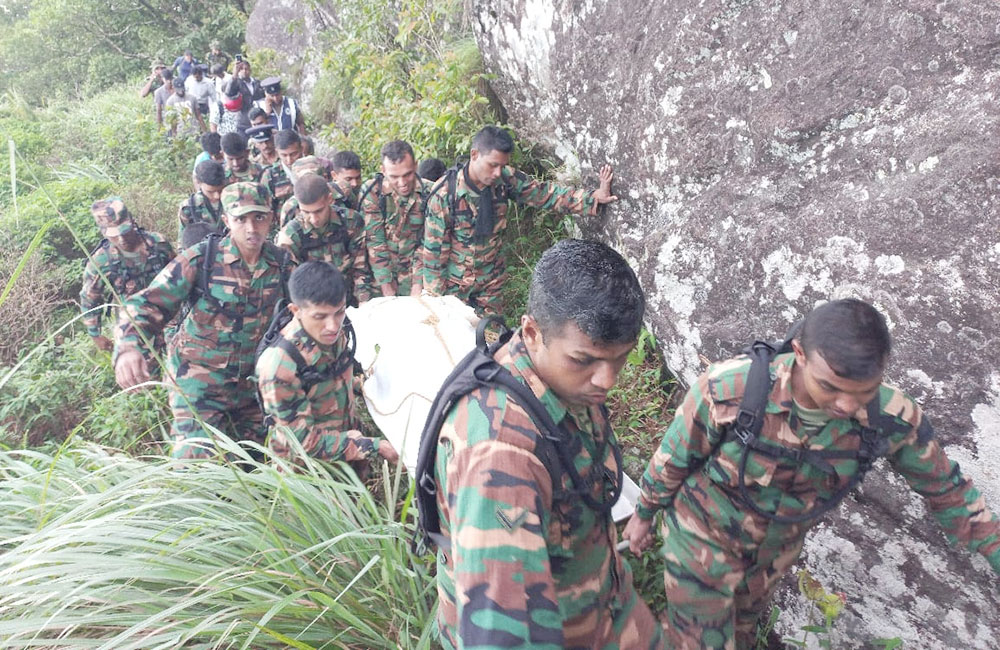
11 Infantry Division Troops Trace Dead Body of Missing Tourist
2 (V) Sri Lanka Sinha Regiment troops of the 11 Infantry Division of the Security Force HQ - Central responding to an SOS appeal of the Kandy Backpackers Hostel in Ampitiya, Kandy rushed to Alagalla hills and traced the dead body of a Danish tourist who had gone missing from the hotel since Wednesday (12).
The Danish national, (Ms) Karb Munk Ebssen on Wednesday (12) around 10.00 am had informed the hotel management that she would go trekking in the mountains and return the same evening but she had failed to return to the hotel as scheduled.
Hotel management around 3.00 pm on Thursday (13) had at first informed the Kandy Tourist Police, and they have in turn sought the assistance of the 11 Infantry Division troops to trace her whereabouts since she had gone missing.
However, troops, engaged in search operations succeeded this morning (14) in tracing the dead body of the victim from a location near the foot of the mountain range, a popular and famous for hiking.
Troops and the Police are currently in the process of removing the dead body to the Police and the hospital for further investigations.
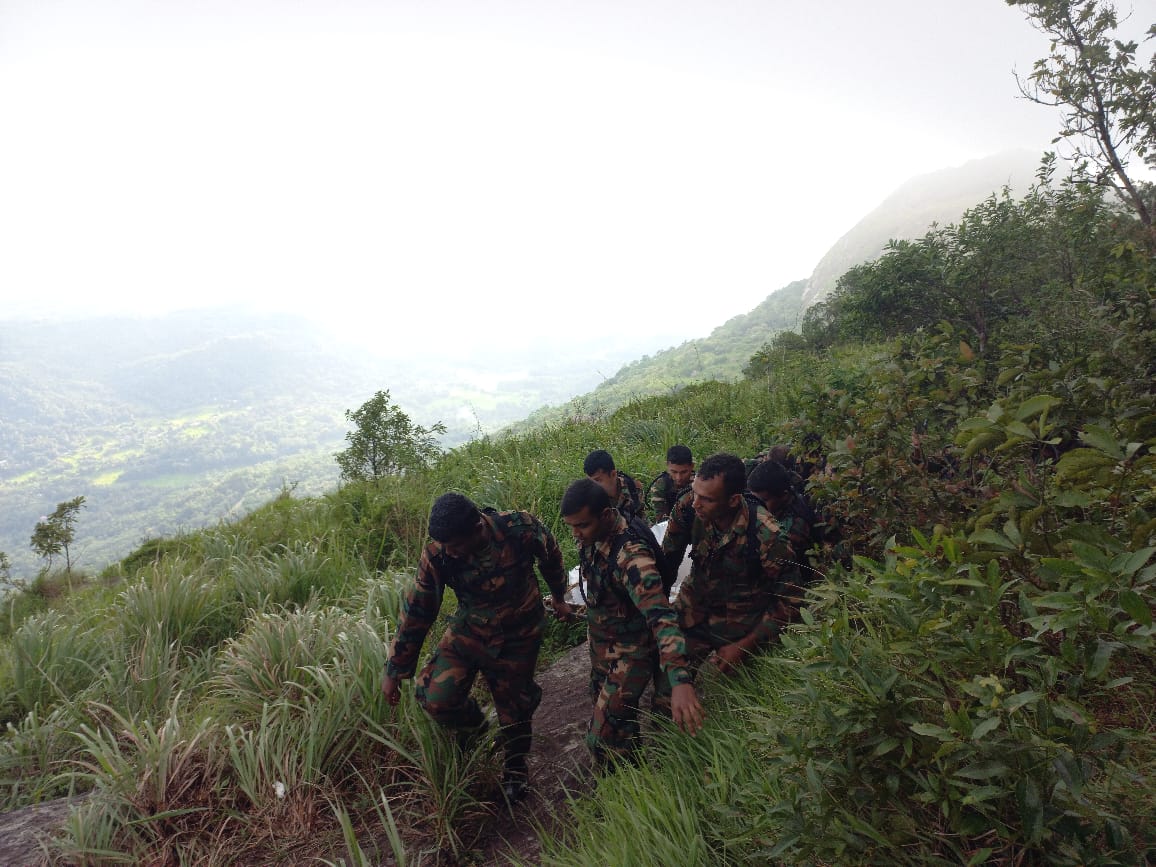
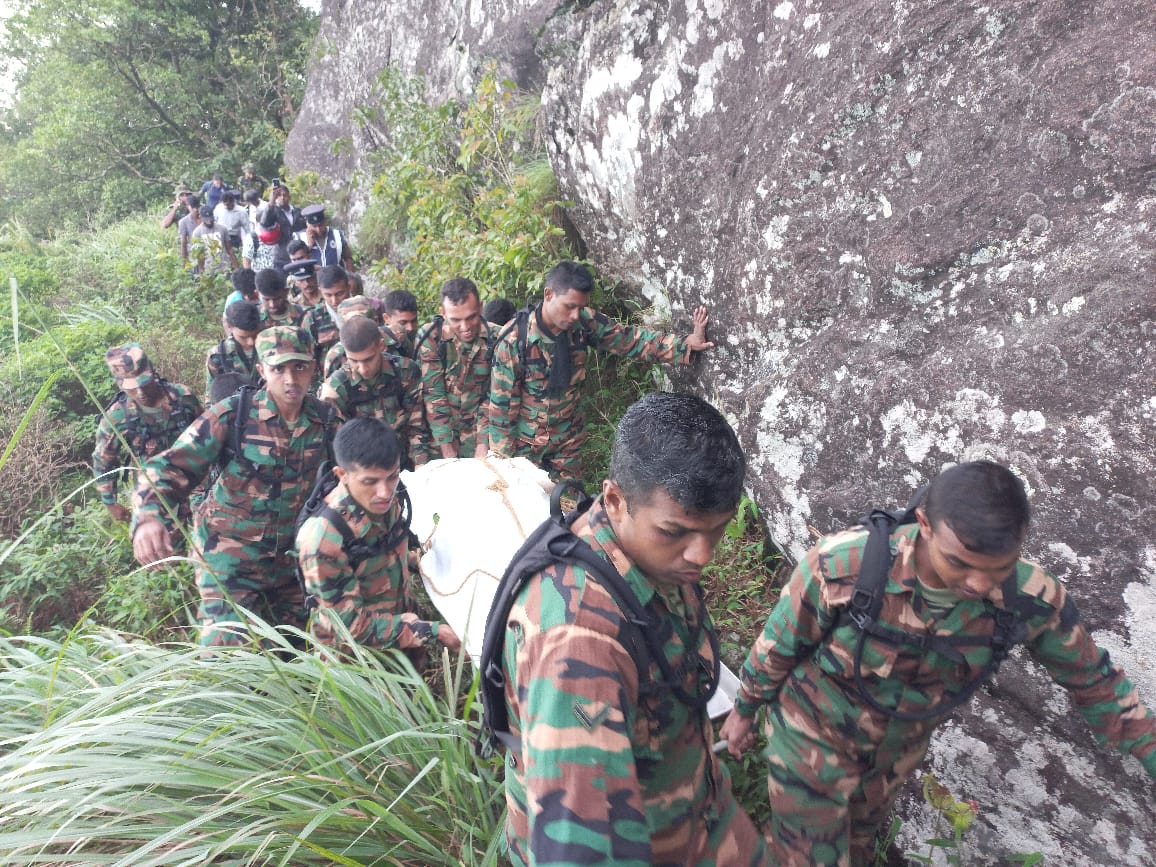
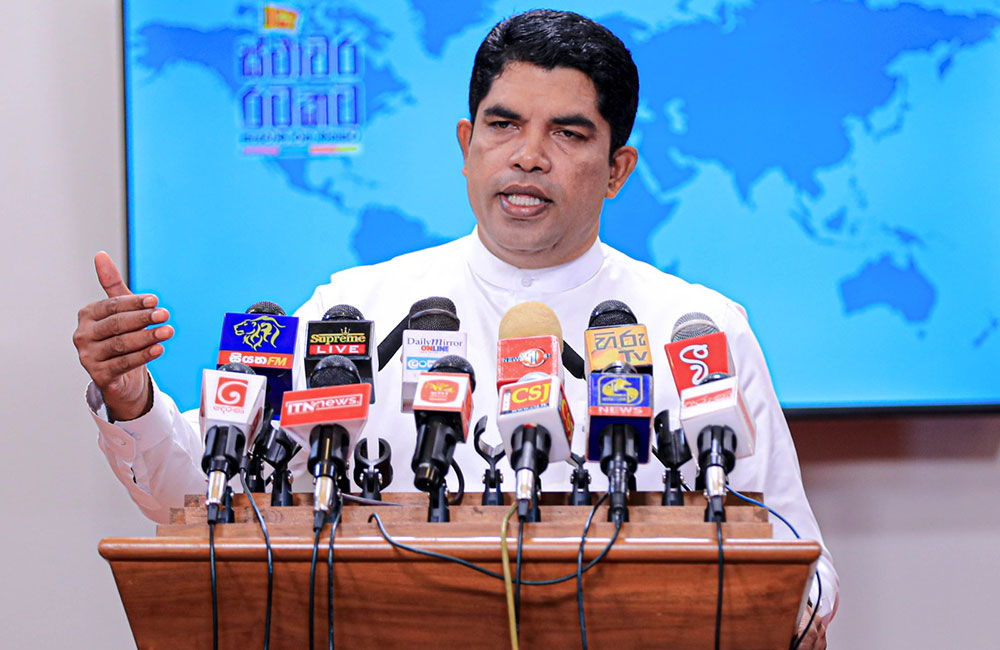
Rs. 10 billion to be spent on modernization of Postal Services
A new Postal Act will be presented to The Parliament within this year to expedite the modernization process of the Postal Department, State Minister of Mass Media Shantha Bandara said at a press briefing held at the Presidential Media Centre today (16).
The State Minister went on to add that the modernization process is planned to be carried out as a joint public-private sector partnership at a cost of Rs.10 billion and assured that the Postal Department will not be privatized at any cost.
He further said that It is expected to convert the Postal Department into a profit-making institution within the next two years, through the digitization of the Department.
The State Minister further said that by the end of 2023, the loss of the Postal Department will be reduced by Rs.4000 million.
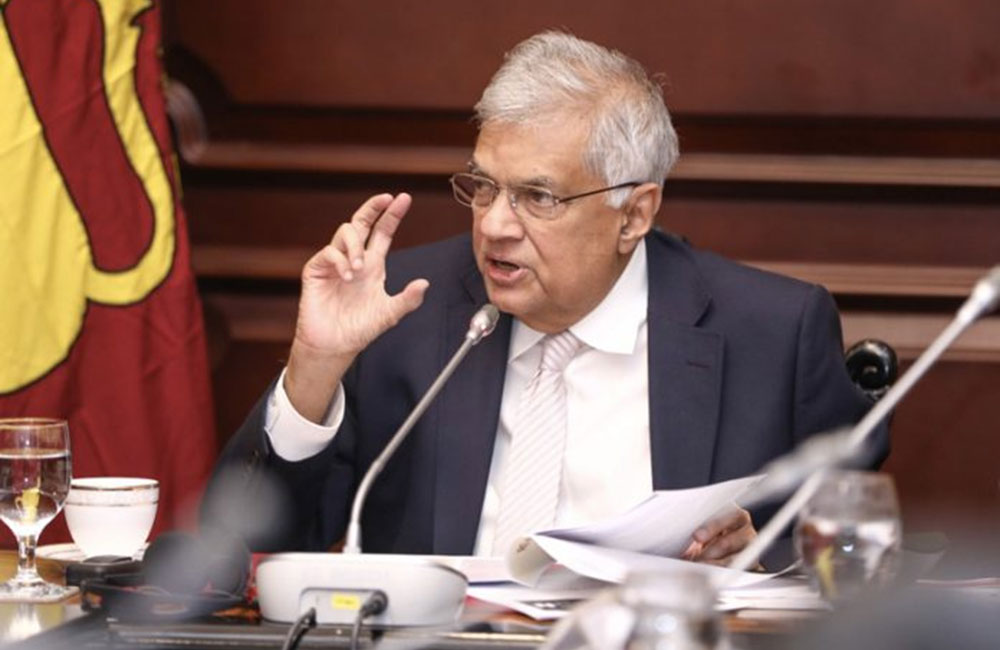
President addresses drug shortage
President Ranil Wickremesinghe today (14) has instructed the Ministry of Health to expedite the approval process for medicines approved for local use.
The ministry was also asked to look into the possibility of directly ordering the approved medicines, without going through the existing process.
President Wickremesinghe said all ministry-run websites must indicate the total amount of medicines available as well as the amounts available in each hospital.
The networking system will enable the exchange of medicines between hospitals, he said.
In addition, the consideration of those from the Arts Stream in the recruitment of nurses, budget allocations, and the need for fully equipped medical facilities was also discussed.
The President also emphasized the importance of utilizing existing resources effectively and promoting accountability.
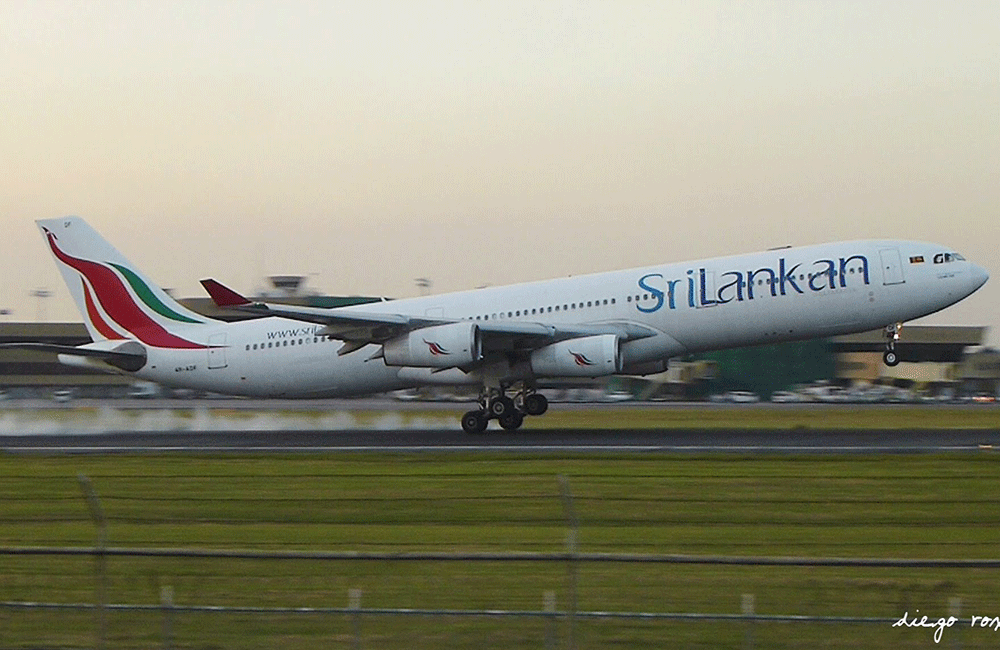
No investor yet for debt-ridden SriLankan Airlines
No investor has so far come forward in response to government plans to privatize the debt-ridden SriLankan Airlines.
Government sources said this has prompted a new plan by the finance ministry for the national carrier to go public with assistance from the World Bank.
SriLankan owes Rs. 316,570 million to state banks, the CPC and other service providers.
It has a 5,600-strong permanent staff, in addition to 500 contract and casual workers.
Some of its departments have a surplus of employees, including 300 managers, while there is a shortage of manpower in certain categories.
In the past three years, 50 pilots had left service with 22 in arrears to meet a requirement of 290.
All of its fleet of 24 aircraft has been obtained on lease, and six of them have been taken out of service due to a non-availability of engines and other spare-parts.
Srilankan has to pay around 700,000 US dollars a month per leased aircraft.
Two aircraft in use for 23 years had been returned.
A voluntary retirement scheme introduced during the coronavirus pandemic has not addressed the surplus segment of employees.
Meanwhile, aviation minister Nimal Siripala de Silva said the carrier will continue with foreign pilots even if all the local pilots leave service.
Speaking to the media, he also said the chosen investor will have the freedom to take administrative decisions during the restructuring.

President instructs to extend retirement age of doctors
President Ranil Wickremesinghe has instructed the Minister of Health and its officials to extend the retirement age of doctors to 63, until the end of 2024.
Meanwhile, this revision will also be made for other special cases as per the requirement of the Ministry, the President’s Media Division (PMD) reported.
This decision was made based on a report submitted by the Cabinet-appointed sub-committee in this regard.
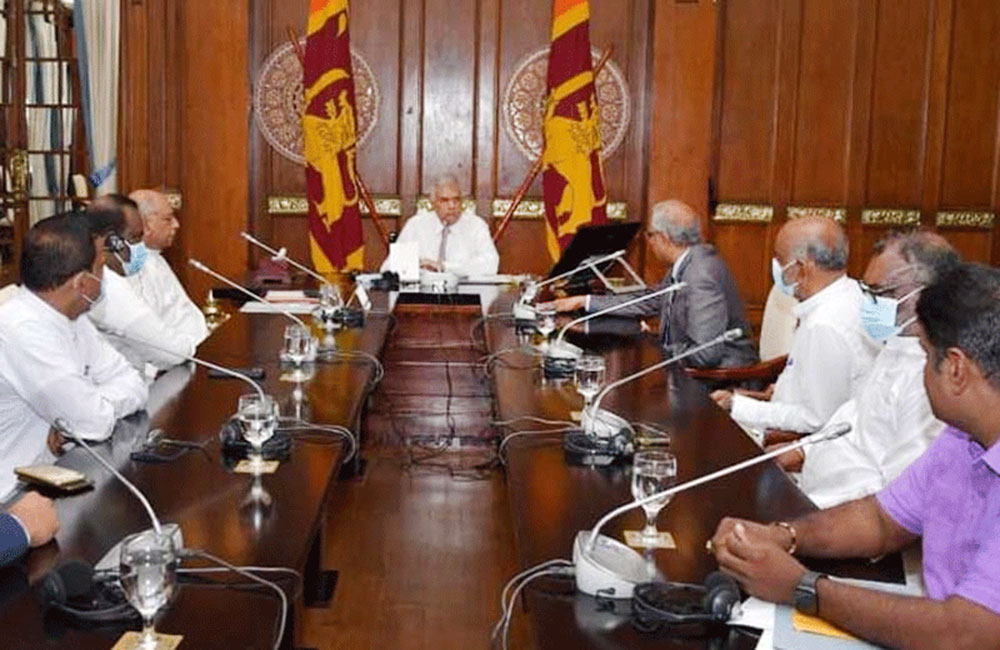
President to meet Tamil MPs prior to India visit
Tamil MPs from the north and the east are due to meet with president Ranil Wickremesinghe on 18 July.
Invitations have been sent out for the meeting that takes place at the parliamentary complex from 3.00 pm.
Government sources said the talks on sociopolitical issues in the two provinces take place prior to president Wickremesinghe’s tour of India.
They include Tamil prisoners, victims of enforced disappearances and land issues.

Import duty on milk powder re-imposed
The government has amended the Customs import duty for milk powder.
Thereby, an import tax of Rs. 100 is charged for one kilogram of milk powder with effect from Wednesday (July 12).
The Customs import duty of Rs. 225 per kilogram of milk powder was previously in place for imported milk powder, however, it was later removed.
Against this backdrop, the Ministry of Finance, Economic Stabilization & National Policies decided to re-impose the Customs import duty on milk powder.
This tax revision will be in place until further notice, the ministry noted.
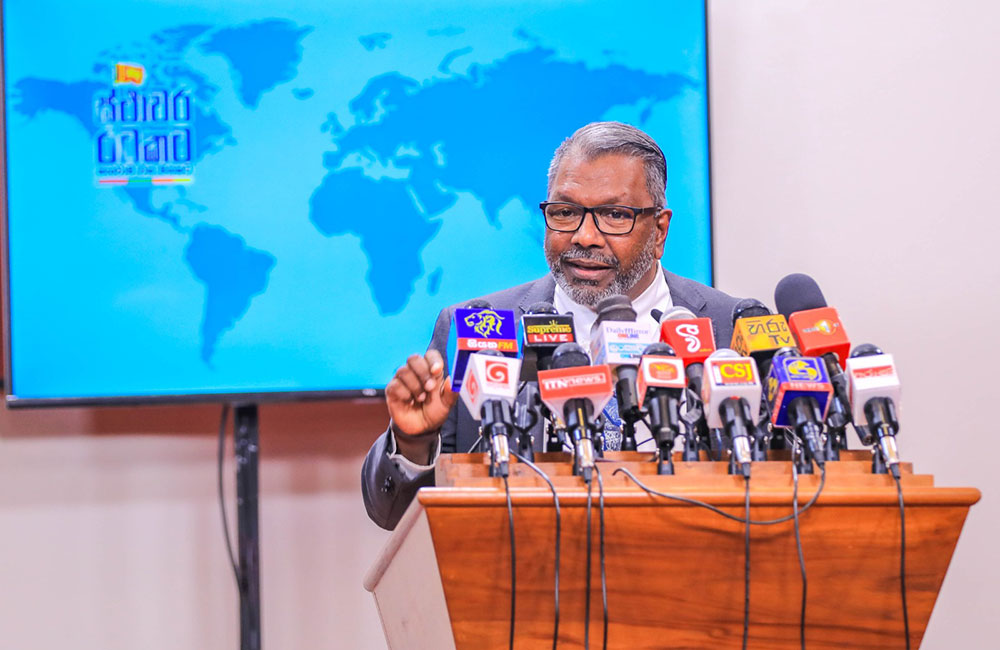
Govt to infuse international standards into Sri Lankan universities
The government aims to create a ‘critical Sri Lankan who is a global citizen in a bid to find answers to the modern and futuristic problems, State Minister of Higher Education Dr. Suren Raghavan says.
Internationalization of the country’s higher education is a top priority of the government, the lawmaker said further, addressing a press conference in Colombo on Friday (July 14). The event themed ‘Collective Path to a Stable Country’ had been organized by the Presidential Media Centre (PMC).
He said the government wants to infuse international standards into local universities in order to make them ‘respected’ higher education institutions in the region, if not in the world, at least by 2030.
In addition, the government also mulls promoting the engagement of overseas Sri Lankan academics in the country’s higher education by allowing them to engage in university lecturing in state universities while on vacation or sabbatical as a measure to encourage their involvement in higher education, the state minister added.
“In this method, we are creating a mechanism so that at least ten Diaspora members will engage in teaching in the 17 government universities in Sri Lanka, which will inculcate their professionalism and experience with our government universities.”
Meanwhile discussions are underway with three prominent international universities to open their branches in Sri Lanka, the state minister added.
“Sri Lanka has always poised to be one of the best hubs for education. South Indian market alone; Kerala, Karnataka, Tamil Nadu, Andhra Pradesh and Telangana is going to have 350 million populations by 2030 and their economy is growing. Where will they go to fulfill their educational needs? It is easy for them to come to Colombo than go to Delhi. We need to look at that market.” Dr. Raghavan said.
Further, the government has held non-regulatory discussions with tuition teachers requesting them to provide their set of recommendations and guidelines to regularize the quality of private tuition education and the safety of students attending these classes, according to the state minister.
“The Advanced Level tuition market is 65 billion. Tuition teachers, parents A/L students are all citizens of this country. So this is a citizen-to-citizen understanding they have to do. Why should the government get involved?” the State Minister said.
Dr. Raghavan also emphasized the importance of understanding the 21st century’s human rights and added that it is the responsibility of the state to provide higher education to every student who wants to pursue higher education.
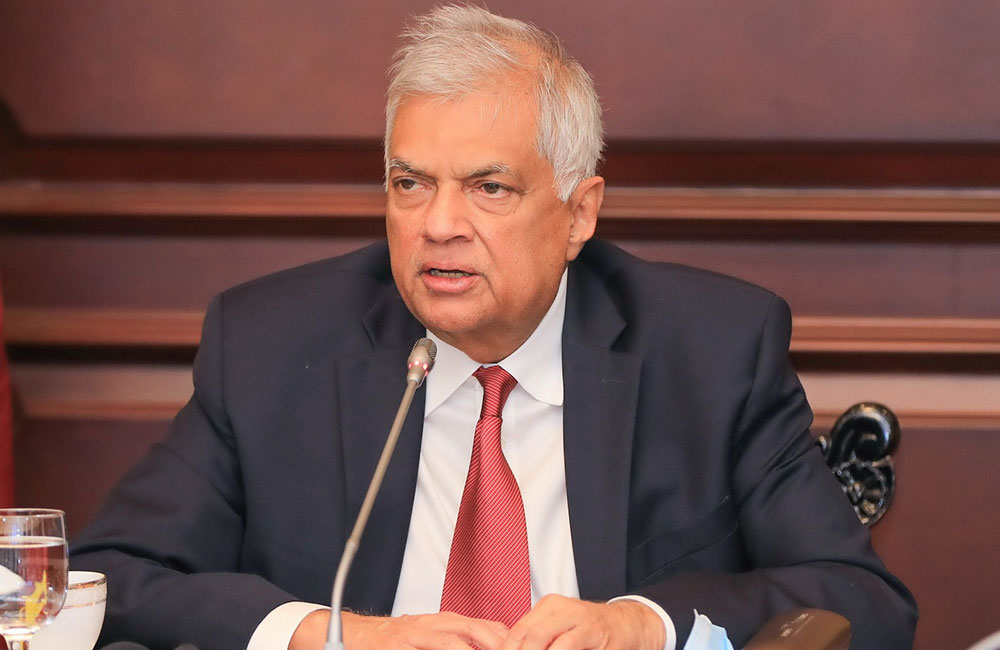
Income generation methods : Sri Lanka to get UK’s support
President Ranil Wickremesinghe stressed the importance of financial discipline in nation-building and announced plans to promptly introduce formal measures to control public expenditure and generate new government revenue.
The President highlighted the need to maximize the value of every rupee spent by the government, as currently, public expenditure often fails to achieve this objective. He expressed concern over not only the neglect of public revenue but also the unrestricted spending of public funds on non-beneficial activities, which has contributed to the economic crisis in the country.
Furthermore, President Wickremesinghe attributed the current financial problems to the lack of parliamentary discussions on this matter in the past two or three years. To address this issue, he informed that several committees have been established in the parliament to examine the state’s financial situation and income tax matters.
President Wickremesinghe made these remarks during the presentation of a report by the committee chaired by State Minister for Finance, Economic Stabilization, and National Policy, Mr. Ranjith Siyambalapitiya, which aimed to propose strategies for generating new sources of income for the state. The report was submitted to the President by State Minister Ranjith Siyambalapitiya at the Presidential Secretariat yesterday (12).
The report encompasses recommendations aimed at establishing a structured framework to attain the revenue goals of the Inland Revenue Department, Sri Lanka Customs, and the Excise Department. It also suggests the implementation of novel approaches to augment government revenue and the creation of a digital economic infrastructure to support these endeavours.
President Ranil Wickremesinghe directed the Minister of State to engage in further discussions regarding these proposals and present them to the Parliamentary Committee on Ways and Means.
Furthermore, the President emphasized the utmost importance of leveraging digital technology to its fullest potential in implementing these recommendations.
He also emphasized the necessity of formally informing the public about these initiatives through an extensive media campaign.
President Ranil Wickremesinghe further said;
“In the current economic crisis, a major concern is the improper collection of tax revenue. Some individuals and entities who are obligated to pay income tax fail to do so, leading to a significant shortfall. Additionally, there have been reports of the government experiencing delays in receiving complete tax revenue from customs, as well as similar accusations regarding excise duty.
During this crucial period of economic recovery, it is imperative to establish comprehensive financial discipline in the country. The first step is to control government expenditure, which is currently being addressed. Secondly, the government must ensure that each rupee spent delivers maximum value, as this is often not the case with public expenditure. Therefore, careful attention needs to be given to this matter within the Parliament. Thirdly, there is a need to increase state revenue. To tackle this challenge, a committee led by State Minister Ranjith Siyambalapitiya has been appointed and entrusted with the responsibility.
I extend my gratitude to everyone involved in the preparation and presentation of this report today.
We must explore new avenues for increasing income tax revenues, as outlined in the report. This aspect has received significant attention within our Parliament. It can be argued that the lack of parliamentary discussions in the past two or three years, along with a lack of interest in certain cases, has been a primary cause of the economic crisis. To address this, several inquiry committees on income tax and the fiscal situation have been established. It is within these activities that we should seek out these new approaches.
Furthermore, digitization plays a crucial role in these endeavours. Those who oppose this transformation should consider stepping aside, as I intend to enforce digitization within a designated timeframe. Any shortcomings that arise should be addressed promptly.
Importantly, the income generation methods we have adopted draw inspiration from the United Kingdom. These methods have been greatly refined and improved over time. Thus, we must examine the latest systems and develop the necessary infrastructure accordingly. Proposed amendments to the Audit Act have been put forward to support this objective.
We have extended an invitation to Mr. Francis Maude, who served under Prime Minister David Cameron and has substantial expertise in this area, to visit Sri Lanka and share his insights on sectoral reform.
When the British colonized this country, they prioritized revenue collection and appointed revenue officers for this purpose. Under a unified administration, revenue officers and local officials, known as Mudaliyar (or Mudali), paid special attention to revenue collection. As a result, income did not decline, and it even increased with the development of tea, coconut, and rubber industries. However, since the 1970s, revenue generation has been neglected, and it has been removed from the administrative agenda of the country. Not only has revenue been overlooked, but state funds have been spent without restraint.”
Minister of State for Finance, Economic Stabilization and National Policy Mr. Ranjith Siyambalapitiya;
This report has been meticulously prepared under the guidance of the President, encompassing short-term, medium-term, and long-term proposals. Its aim is to streamline existing sources of income and introduce new ones, ensuring that the burden on the people remains minimal.
It is important to acknowledge the wealth of experience we have gained while addressing the challenge of state revenue. Thanks to the President’s guidance, we have attained a certain level of stability. However, there are still numerous objectives to achieve in order to increase our state revenue in proportion to the gross domestic product.
We have reached the limits of introducing new taxes and raising tax percentages. Therefore, our focus must now shift towards expanding the tax base and closing the gaps in the tax net to enhance revenue generation.
Moreover, great emphasis has been placed on enhancing government revenue through improved competitiveness and transparency. Extensive discussions with all stakeholders have been on-going, leading to a fair resolution of long-standing contentious issues.”
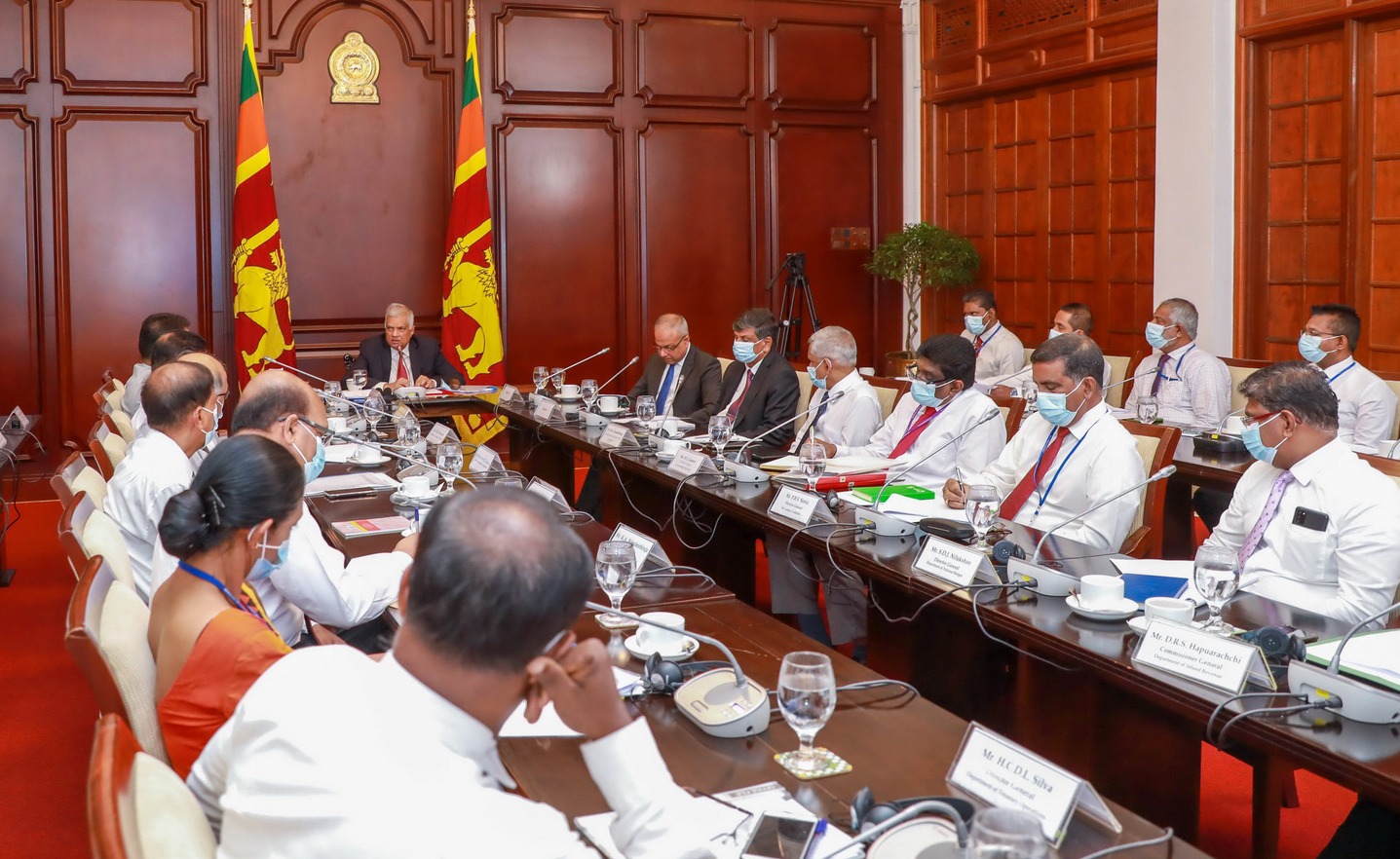
Page 259 of 681